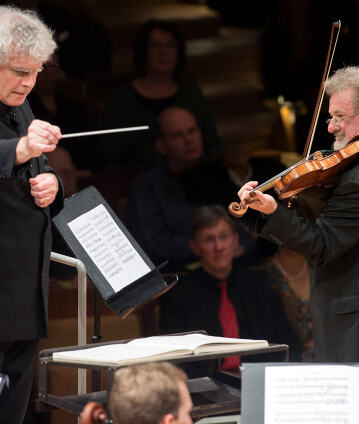Simon Rattle and Daniel Stabrawa

Albert Roussel and Jean-Philippe Rameau – though born 200 years apart – were brothers in spirit: individual, surprising, with a unique sense of timbre. All these qualities manifest themselves in this concert with Roussel’s Le Festin de l’araignée and Rameau’s Les Boréades. In addition, Simon Rattle and Daniel Stabrawa interpret Karol Szymanowski’s Violin Concerto No. 2, which shimmers wonderfully between Impressionism and Polish folk music.
With Le Festin de l’araignée (The Spider’s Feast), Albert Roussel created one of the most richly colourful ballet scores of the 20th century – a brilliantly orchestrated ballet-pantomime in which the microcosm of insects becomes an ironic mirror image of human life. The premiere of the impressionistic, shimmering masterpiece on 3 April 1913 was Roussel’s first great success – no wonder that the former student of Vincent d’Indy soon created a version for the concert hall that Sir Simon Rattle has placed at the beginning of this concert.
Following this, Daniel Stabrawa, 1st Concertmaster of the Berliner Philharmoniker, plays the second violin concerto by his countryman Karol Szymanowski, considered among the greatest creative talents of Polish music history of the 20th century. The work, in which the rich texture of the orchestra part provides a virtually kaleidoscopic diversity of timbres due to the use of constantly changing instrumental groups, is influenced by the folklore music traditions of the High Tatra, which are inextricably combined with Szymanowski’s own composing.
After the interval, Sir Simon presents a work that he introduced as his very own trademark during the 18 years he was in Birmingham, and that he conducted in Berlin for the first time in early November 1993: an arrangement of his own of Jean-Philippe Rameau’s last Tragédie lyrique Les Boréades, not premiered in concert until more than 200 years after it was composed. Rehearsals were held for the work, which Rameau composed at the age of 80 in the penultimate year of his life, and with the most prominent singers of the Paris Opéra of the time. But the premiere announced for the spring of 1764 did not materialise. The reasons for this could have been the libretto, which glorifies égalité and fraternité, as well as the extreme difficulties that the score offers, not only in the vocal parts.
© 2016 Berlin Phil Media GmbH
Related interview